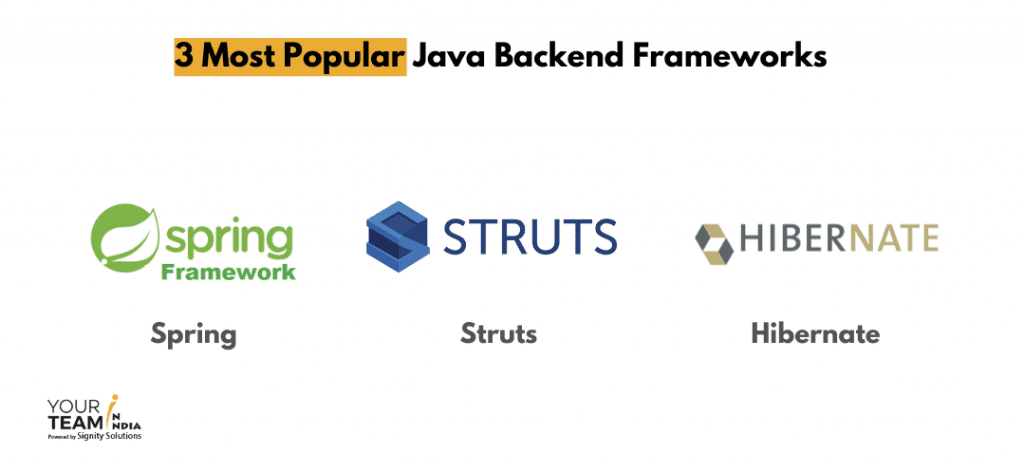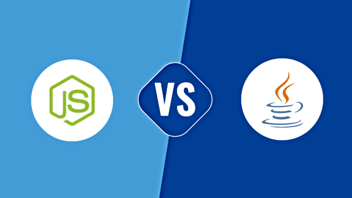Quick Summary: Java for backend development is a popular programming language due to its platform independence, robustness, and community support. In this article, we will highlight 20 reasons why Java is an excellent choice for developing secure and scalable applications in 2023.
Why should you use the popular programming language Java for backend development? This is an important question if you plan to build a new web or mobile application.
And, If you are looking for ways to expand the efforts of your backend development team, you need to choose the right technology and framework. It will help boost production during the software or web development process, and developers will ensure that you do not compromise security and product quality.
Choosing to hire dedicated Java developers is a go-to solution that lets you leverage an agile environment for backend development along with domain and technological expertise that comes from working with a dedicated software development partner.
This blog post highlights the perks of choosing Java for backend development. Let's explore this in detail.
Key Takeaways
- Java's platform independence allows developers to write code once and run it anywhere, making it a versatile language for backend development.
- The robustness of Java makes it an ideal choice for developing secure and scalable applications that can handle large amounts of traffic.
- The vast community support for Java ensures that developers have access to a wealth of resources, libraries, and tools to help them build and maintain their applications.
- Java's performance, ease of use, and flexibility make it a popular choice for developing enterprise-level applications, making it a valuable skill for any backend developer to have.
21 Reasons to Choose Java for Backend Development
Let's dive into the post to find the 20 top reasons for choosing Java for backend development in 2023.
1. The Programming Language for the Enterprise
Java is the most popular programming language for building enterprise and web applications. Since enterprise-grade applications have heavy performance requirements, they need a technology stack to handle the activities.
Enterprise apps also need robust security to ensure the confidentiality of data, which is where Java development turns out to be valuable.
If you are a developer, you must know the potential of Java. Although there are a few lighter and easier languages than Java, Java is a relevant solution for various enterprise applications.
Recommended Read: Why Java is the Preference for Top Entrepreneurs?
2. The Unstoppable Growth
Since Java was created 24 years ago, this programming language has evolved and adapted from the beginning to suit the latest market trends.
It has even increased the demand for hiring developers from India. Simply because, nowadays, the offshore software development trend is taking over the industry.
Furthermore, with ample features in every release, companies are becoming more interested in using Java not only for backend development but also for enterprise applications.
3. Great Performance
The Java compiler is specifically designed for performance. The code is compiled into byte code and then compiled by the Java compiler. Before converting into machine-level code, the code runs through Java Virtual Machine.
4. Mobile App Segment Still Holds Java
Java-based apps are everywhere, whether a Windows, Android, or iOS smartphone. We have now switched to Swift for iOS and Kotlin backend for Android apps, but professional developers having a strong Java base can quickly master these languages.
These programming languages are improved versions of Java with many similarities at the core. To make a mark in the Android app industry, Java is the key to success.
Recommended Read: Java Vs Kotlin Head-to-Head Comparison for Mobile App Development
5. Secure
Safety characteristics are built in Java and the runtime system. Runtime checking and static type are checked at the compile time. Having such features, it becomes challenging to invade a Java-based application from outside.
We all know the importance of data security. Therefore, to build mobile apps that are both secure and robust, companies prefer to hire Android app developers with hands-on expertise with Java.
6. Ease of Coding
The coding ease defines how simple a programming language is. This holds for Java as well. Because it has less ambiguous syntax terminology, anyone can start with Java with fundamental programming principles.
7. Object-Oriented Programming Language
Being an Object Oriented Programming Language, it has various concepts that are relatable. Java has become a more accessible, flexible, modular, and extensible language.
Java supports principles like Data Abstraction, Polymorphism, Encapsulation, Overloading, and Inheritance. According to the backend web developers, this makes the language as powerful as C++.
8. Inspired by C & C++
C & C++ are very long-tenured programming languages that are the ancestors of Java & Python. Java resembles C & C++ but doesn't have characters like pointers and multiple inheritances. Therefore, coders understanding C and C++ can grab Java easily & quickly.
9. Platform Independent
As soon as we read this term, Flutter pops up in our heads. Because it is a cross-platform framework for mobile apps, it gives strong competition to native apps. So, it's quite easy to understand why companies hire Flutter developers aggressively.
But Java is at the top in building scalable web apps with cross-platform functionality. Taking a tour back to the '90s, "that is the birth of Java," what Flutter is doing nowadays, Java started back during its first version.
The tagline "write once and run anywhere" started grabbing lots of attention. And this feature still entices businesses that are low on a budget because most of the Java apps are developed in the Windows environment and run on the UNIX platform.
10. Robustness
Robustness equals reliability, and no other language except Java assures this. In fact, it is the most highly supported programming language that is robust & scalable. Additionally, automatic memory management and garbage collection features make it portable across many platforms.
11. Java is Everywhere
Yes, this programming language is omnipresent on desktop systems, smartphones, the web, embedded systems, or wherever you can think. Having efficient stability and scalability, Java has become a universal programming language. For this reason, Java is gradually gaining a big name in the Internet of Things realm.
12. Multithreading
Java holds multithreading capabilities. This means that you can develop highly interactive and responsive apps with the help of several concurrent threads of activities. To simplify, there is the concurrent execution of two or more parts of a program for maximum CPU utilization.
The multi-threaded environment supported by Java also gives users a quick response time, fewer issues, multi operations, better performance, and faster concurrent access.
13. Rich Programming API
Java API offers everything a successful program needs to know, whether input/output handling, networking, utilities, query handling, database connection, XML parsing, data and time handling, or anything else as per requirement.
Do you know there are approximately ten thousand Java open-source libraries? Yes, that's true. Apache Commons, Spring MVC, and Hibernate are some of them. This is another reason why it is preferred for backend programming.
Recommended Read: Best Advantage of Java Outsourcing Development
14. Free Development Tools
The cost of the development tools has an impact on the programming language's popularity. If the tools are free to use, the expert engineers will willingly utilize them.
Since Java is an open-source language and free for all, almost all development tools are free downloadable. This makes developers enthusiastically code in Integrated Development Environment, especially if coding in DOS or notepad.
Eclipse and NetBeans are two powerful development tools. They have plenty of useful features to make development faster, like code completion, code debugging, formatting, refactoring, test server deployment, and code management, and the long list. It is quite simple to search, debug, refactor, read, and write code in IDEs.
Besides that, Java also offers tools like JConsole, Visual VM for profiling, and decompilers.
15. A Huge Developer's Community
For the survival of any programming language, the developer's community is important. The bigger the community, the more support the developers will likely get. They will use Java Development Backend tools and libraries to make the programming/development easy and fast.
You will be surprised that Java has the 2nd largest StackOverflow community. There are innumerable backend developers, front-end developers, and Android App developers.
Also, Java has the 4th largest Meetup community, with 1,400 Java Meetup groups completing over 580,000 members across the globe. In addition, Java is the 2nd most-tagged language on Github, with over 1.5 million Java projects, and more than 500 individuals have starred 1100.
Recommended Read: Top 10 Backend Development Companies
16. Powerful Memory Management
In programming parlance, memory is divided into stack and heap. Java can allocate stack memory per thread, and heap stores the actual objects. Heap memory is one in each JVM. The sizes of stack and heap depend on the JVM.
17. Rich Ecosystem Environment
There are a few prominent tools and frameworks in the Java ecosystem:
Eclipse IDE: The most successful open-source IDE, Eclipse integrates with the Java compiler. Compilation errors are excellent facilities for organizing your project and Git version control.
Maven: The enterprise build tool can manage the software. Maven gives a standardized approach to creating, testing, packaging, and deploying the code. This also allows for documenting the project well.
Spring Framework: The intention of development is simply enterprise Java development. It is prominent in the Java server framework space, with over a million users. There are several useful modules and an open-source framework. And examples are Spring Security and Spring Integration.
18. Open-source Libraries
Java offers different sets of libraries for different purposes: PDF and Excel Reading libraries,
JSON parsing, unit testing, XML and HTML parsing libraries, messaging, cryptographic libraries, and many more.
The majority of Java libraries are open-source and supported by certified and experienced Java developers. The use of such libraries significantly boosts the backend programming of web apps.
19. Cross Platform
Java is an object-oriented compiled language that enables you to write the code once and run it on multiple platforms (Mac OS, Linux, and Windows), making it a reliable choice for web development, mobile application development, networking, database connectivity, and many more.
20. Memory Management
Java provides memory management to allocate or de-allocate objects. It helps in optimizing the effectiveness and speed of web or mobile applications. Java has an automatic memory management system called a garbage collector.
The garbage collector handles the allocation and release of memory to make space for an application. For developers working with managed code, this means that you don't have to write code to perform memory management tasks.
Java memory management divides into two different parts:
- JVM Memory Structure
JVM defines various runtime data areas used during a program's execution. Some of the areas are built by the JVM, and some are created by the threads that are utilized in a program.
- Working of the Garbage Collector
Program execution in Java employs memory in different ways. The part of memory where objects live is called a heap. This part of memory incorporates into the garbage collection process.
The garbage collector helps identify and delete objects that cannot be reached. It ensures that the heap has as much free space as possible.
3 Most Popular Java Backend Frameworks

1. Spring
Spring is an open-source framework used for Enterprise applications. It helps developers create loosely coupled modules where-in dependencies are handled by the framework rather than depending on the libraries in the code.
Spring framework offers many features, including security and configuration, which are easy to execute. Further, this most popular web framework has a lot of documentation and an active community.
2. Struts
Apache Struts is a popular robust open-source framework used for web applications. Its functioning is based on the MVC (Model-View-Controller) Model and expands the JSP API. In a traditional servlet-JSP approach, if a party submits a form containing its details, the information then moves to a servlet for processing, or the control moves over to the next Java Server Pages (JVP – where one can write Java code in an HTML).
This challenges complex applications as the 'View' or presentation layer should not have business logic.
Struts split the View, Controller, and the Model (data) and deliver the binding between each through a configuration file struts-config.xml.
3. Hibernate
Hibernate is another popular Java backend framework. Its abstraction layer enables you to interact with your database, from establishing connections to implementing CRUD operations.
It's worth noting that Hibernate cannot fix several issues with Java Database Connectivity (JDBC) and is not a fully independent framework. However, its support of object-level relationships and its abstraction layer makes JDBC much easier to use.
Planning to build a rich web app using Java? Hire backend developers from Your Team in India.
Java is Here to Stay!
The most volatile field nowadays is software development, as a new programming language is developed every other day. Java is a magic potion that can take an enterprise to another level.
This age-old language is here to stay forever. The developers' long commercial life and wide adoption of Java for backend development have built a robust ecosystem of libraries, documentation, and frameworks for e-commerce, security, and transactional architecture.
Considering that you have already decided to choose Java for your next project. Do you have a team of java programmers in place? No? Planning to build a team in an offshore location?
Frequently Asked Questions (FAQs)
What is Java, and why is it popular for backend development?
Is Java difficult to learn for backend development?
Can I use Java for building web applications?
Is Java suitable for developing enterprise-level applications?
What are some of the benefits of using Java for backend development?









